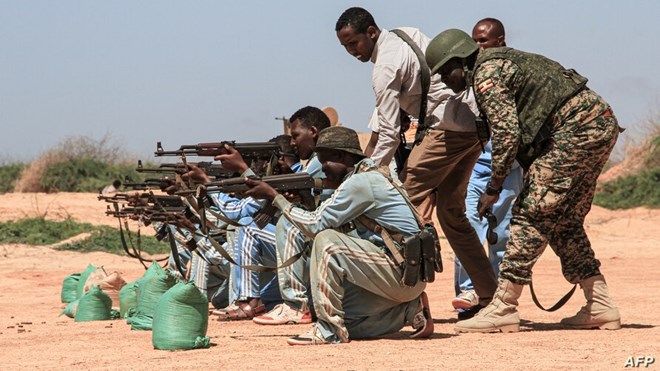
Friday August 6, 2021
By Harun Maruf

FILE - Ugandan instructors of African Union's peacekeeping mission in Somalia coach Somali soldiers during a training session in Ceeljaale, Somalia, Sept. 19, 2019.
The Somali government has formally rejected African Union recommendations for a scaled-down peacekeeping presence in the Horn of Africa country, calling a report and its proposals “devoid of realities.”
“The experts who conducted the assessment didn’t sufficiently consult with the federal government of Somalia,” Foreign Minister Mohamed Abdirizak told VOA Somali, saying the government informed the AU of its position last week. “The report and options are not good options at this point.”
Reduce, reconfigure presence
But AU officials, concerned about funding, have sought to draw down and reconfigure the peacekeeping posture. In April, Somali officials agreed to take the lead in security responsibilities by year’s end.
In a report dated May 30, an AU assessment team proposed four options. Its first and preferred recommendation would be a hybrid mission of the African Union and United Nations, with a mix of police (50%), military personnel (35%) and civilians (15%). The AU report did not specify troop strength but recommended a gradual reduction.
The U.N., which conducted its own assessment earlier this year, did not call for a hybrid mission. Instead, it recommended that AMISOM reconfigure and modify its mission – the AU team’s second option.
The AU team’s remaining two options were deploying an East African standby force or having AMISOM exit the country. The report’s authors said the latter could be accomplished in six months, but they warned against a hasty exit.
Earlier this year, the United States pulled out most of its troops, repositioning them elsewhere in East Africa. It resumed military airstrikes against al-Shabab militants in Somalia on July 20, after a six-month lull.
The AU report criticized the Somali government and federal member states, saying their failure to resolve issues of constitutional review and the sharing of power and resources had contributed to challenges in stabilizing the country.
"Somali political actors do not respect their own agreements; political actors show deference to the clan rather than the federal constitutional order,” the report said.
Abdirizak, the foreign minister, said his government had devised a Somali transition plan (STP) “that eventually transfers security responsibilities to Somalis. It’s a plan where the leadership of security will be taking their views and orders from the Somali side. This is the best way to transition AMISOM security responsibilities to Somali security responsibilities.”
But, he complained, “none of the four [AU] options currently presented mentions STP.”
AMISOM did not respond to VOA’s request for an on-the-record interview.
Lack of coordination
The AU assessment came amid emerging accounts of miscommunication and poor coordination between Africa Union and Somali military leadership. But several AMISOM and Somali government officials, who spoke on condition of anonymity, cited tension between Somali Brigadier General Odawaa Yusuf Rageh and Lieutenant General Diomede Ndegeya, commander of the AU forces in Somalia.
“There is some bad blood between the two,” said a senior AU official in Mogadishu, who asked not to be named because he was not authorized to speak to reporters.
The differences between Rageh and Ndegeya – who both declined VOA’s requests for interviews – reportedly stem from a military operation that the Somali National Army (SNA) conducted against al-Shabab in the Middle Shabelle region. The army reported that the six-week operation, which began May 23, accomplished its objectives by clearing al-Shabab from a vast rural area and killing more than 100 militants.
The senior AU official said that, though AMISOM soldiers operate in the area, Rageh did not inform them of the Somali military operation.
The senior AU official said there was no collaborative planning. He suggested that Rageh “wanted to showcase his ability to execute missions even without AMISOM, and this has backfired.”
The AU official said that midway through the operation, Rageh asked AMISOM for air support – and was refused.
Rageh “wanted choppers to be used to fire” at al-Shabab positions in a forested area but “they did not have area coordinates of the enemy; they had no clear intelligence about the enemy,” which has anti-aircraft guns, the AU official said.
Colonel Ali Hashi Abdinur, spokesperson for the Somali army, denied tensions between the commanders. “The cooperation is going very well. There is no dispute,” he said.
Contention over mobile forces
Abdirizak says his government wants AU forces to play a supporting role, with timely handover of security responsibilities to Somali forces. He is asking AMISOM to provide mobile forces to fight alongside Somali troops.
On Monday, Somali security forces captured two key areas in central Galmudug state. They were led by U.S.-trained commandos called the Danab Brigade – lightning-quick mobile forces capable of operating on multiple fronts. Somali government officials say AMISOM operations need to be modeled after Danab’s mobile operations.
But the senior AU official said AMISOM hasn’t been able to provide mobile support because it’s burdened by running several forward operating bases for which Somalia failed to take responsibility.
When the Somali army demanded a mobile force, “we said, ‘You are the same people who tied our hands,’ ” the senior AU official said.
Lack of coordination is not surprising, said Samira Gaid, a national security expert.
“Ultimately, we are on two different clocks,” said Gaid, who served as security adviser to former Prime Minister Hassan Ali Khaire.
Gaid warned that miscommunication could breed mistrust and undue tension between two entities expected to work together.